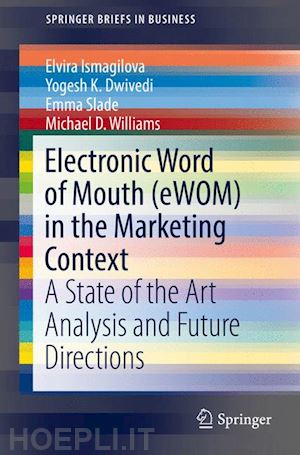
Questo prodotto usufruisce delle SPEDIZIONI GRATIS
selezionando l'opzione Corriere Veloce in fase di ordine.
Pagabile anche con Carta della cultura giovani e del merito, 18App Bonus Cultura e Carta del Docente
This SpringerBrief offers a state of the art analysis of electronic word-of-mouth (eWOM) communications and its role in marketing. The book begins with an overview of traditional word-of-mouth (WOM) and its evolution to eWOM. It discusses the differences between traditional and online WOM. The book examines why people engage in eWOM communications, but also how consumers evaluate its persuasiveness. It also looks at the effects of eWOM. The book identifies current gaps in the eWOM research, but also highlights future directions for this growing field.
eWOM is an important marketing technique in brand communications, and it plays an important role in modern e-commerce. Marketers become extremely interested in enhancing the power of eWOM developing loyalty programs and building brands. Studying the effect of eWOM can be beneficial for companies. This book should be a good resource for scholars and practitioners that need to understand the pervasive effects of eWOM.Chapter 1 Introduction.- Chapter 2 Traditional Word-of-Mouth (WOM).- Chapter 3 Electronic Word-of-Mouth (eWOM).- Chapter 4 Engaging in eWOM.- Chapter 5 Persuasiveness of eWOM Communications.- Chapter 6 Impact of eWOM.- Chapter 7 Managing eWOM. Chapter 8 Conclusion.
Elvira Ismagilova is a PhD candidate at the School of Management, Swansea University, UK. She holds a BSc in Applied Informatics in Economics from Udmurt State University, Russia and MSc in Economics, Accounting and Finance from Bristol University, UK. Her research interests include consumer behaviour, electronic word-of-mouth and social media marketing. She participated and presented her research in various international and domestic conferences including I3E2016 and BAM. Also, she is a teaching assistant in marketing at Swansea University.
Yogesh K. Dwivedi is a Professor of Digital and Social Media, Director of the Emerging Markets Research Centre (EMaRC), and Director of Research in the School of Management at Swansea University, Wales, UK. His research interests are in the area of Information Systems (IS) including the adoption and diffusion of emerging ICTs and digital and social media marketing. He has published more than 100 articles in a range of leadingacademic journals and conferences. He has co-edited more than 15 books on technology adoption, e-government and IS theory and had them published by international publishers such as Springer, Routledge, and Emerald. He acted as co-editor of fifteen special issues; organised tracks, mini-tracks and panels in leading conferences; and served as programme co-chair of IFIP WG 8.6 Conference and Conference Chair of IFIP WG 6.11 I3E2016 Conference on “Social Media: The Good, the Bad, and the Ugly” . He is Associate Editor of European Journal of Marketing and Government Information Quarterly, Assistant Editor of JEIM and TGPPP and Senior Editor of Journal of Electronic Commerce Research.
Emma L. Slade is a Lecturer in Digital Marketing and Deputy Director of Postgraduate Research in the School of Management, Swansea University, UK. She has a PhD and MSc with distinction in Business Management. Emma is working on a variety of research topics across marketing and information systems including engagement with political parties on social media, students’ cyber-slacking behaviour, and diffusion of green IT/IS. Emma has published articles in a number of highly regarded journals such as Public Management Review, Psychology & Marketing, Information Systems Frontiers, and Computers in Human Behaviour. A full list of her publications can be found on Google Scholar. In 2016 Emma was selected for participation in the inaugural Digital Economy Crucible funded by EPSRC through the CHERISH-DE multidisciplinary research centre. Emma was also Programme Co-Chair of the 15th IFIP I3E Conference on “Social Media: The Good, the Bad, and the Ugly” (#I3E2016).
Michael D. Williams is a full Professor, Deputy Dean, Head of the Department of Business, and Director of the i-Lab in the School of Management at Swansea University in the UK. He holds a BSc from the CNAA, an MEd from Cambridge University, and a PhD from the University of Sheffield. Prior to entering academia, he spent 12 years developing and implementing ICT systems in both public and private sectors in a variety of domains including finance, telecommunications, manufacturing, and local government, and since entering academia, has acted as consultant for both public and private organizations, and as regional government advisor in the UK and the European Union. With current research interests focusing primarily upon digital innovation and social media at organizational and individual levels, he is the author of numerous fully refereed and invited papers, has editorial board membership of a number of academic journals, and has obtained external research funding from sources including the European Union, the UK NHS, the Nuffield Foundation, and the Welsh Government.











Il sito utilizza cookie ed altri strumenti di tracciamento che raccolgono informazioni dal dispositivo dell’utente. Oltre ai cookie tecnici ed analitici aggregati, strettamente necessari per il funzionamento di questo sito web, previo consenso dell’utente possono essere installati cookie di profilazione e marketing e cookie dei social media. Cliccando su “Accetto tutti i cookie” saranno attivate tutte le categorie di cookie. Per accettare solo deterninate categorie di cookie, cliccare invece su “Impostazioni cookie”. Chiudendo il banner o continuando a navigare saranno installati solo cookie tecnici. Per maggiori dettagli, consultare la Cookie Policy.